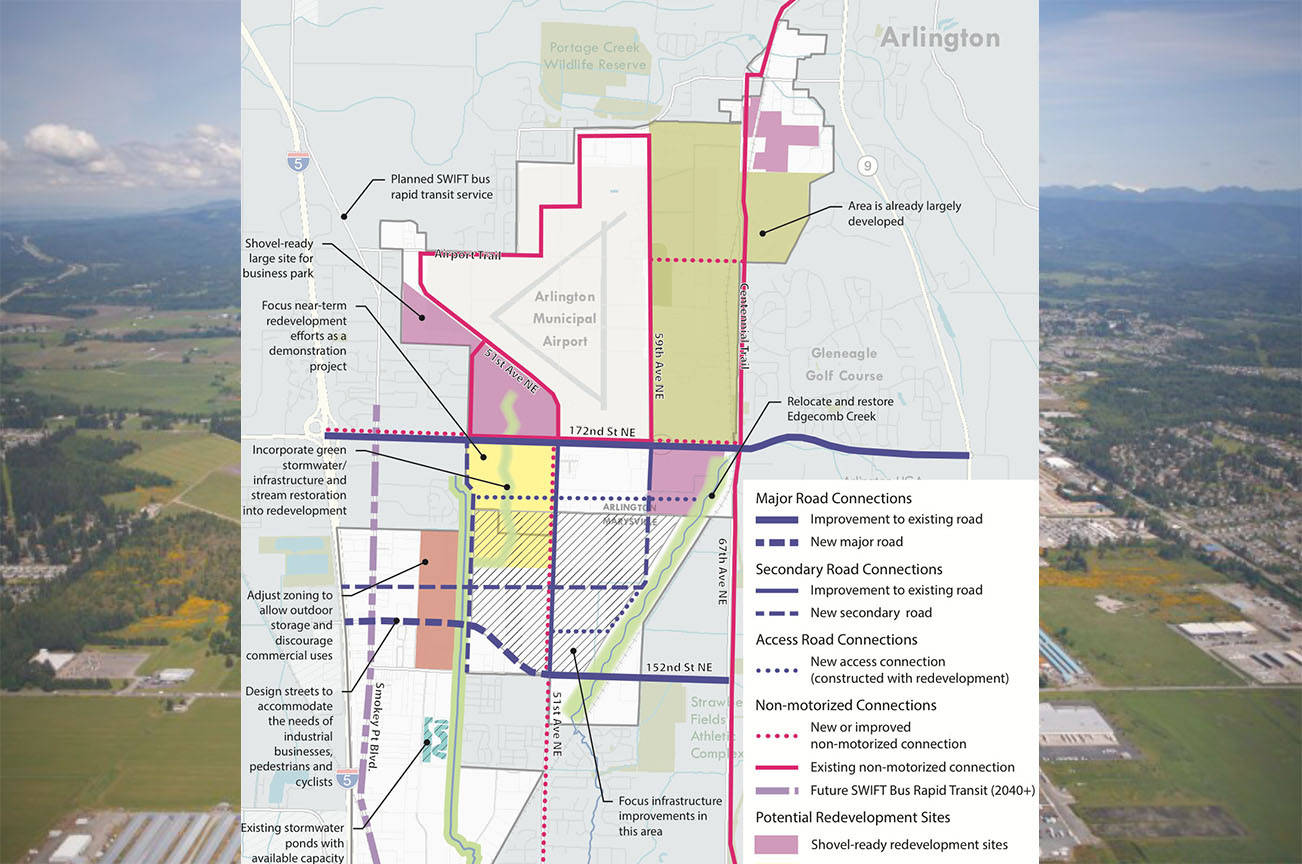ARLINGTON – The City Council Monday approved the Arlington-Marysville Manufacturing Industrial Center subarea plan, a key step in the area’s goals to become a designated regional jobs center.
“This critical work will help bring family wage jobs to our local area, reduce traffic congestion and improve our local quality of life,” Mayor Barb Tolbert said of the months-long planning process between the two cities and other stakeholders.
Total land area within the MIC boundaries includes 4,019 acres, of which 57 percent is in Arlington and 43 percent in Marysville. It includes the 737-acre Arlington Municipal Airport and land south of 172nd Street NE in the Smokey Point area. About 1,762 acres – 44 percent – consists of land ready to develop or redevelop.
“This is our guidance document for development from this time forward,” said Marc Hayes, Arlington community and economic development director.
The cities are pursuing regional designation from the Puget Sound Regional Council for the MIC, which could create as many as 25,000 family wage jobs by 2040. The Marysville City Council plans to adopt the plan in January, officials said.
At the Arlington public hearing Monday, frustrated residents in the Airway Mobile Home Park within the MIC spoke about what could happen if the park is purchased and they need to relocate.
Holly Sales said she lives on $739 monthly Social Security. “Where else could I go with that?
“I cannot sell my home, I have no equity,” she said. “What will I do?”
That was on resident Saundra Baker’s mind, too.
“We have no money to buy another trailer or mobile or anything,” Baker said.
Even with a state law that requires one-year advance notice of a park closure and mobile home relocation assistance program that pays $7,500 toward the cost of moving a single-wide mobile home or $12,000 for a multi-section home, that’s not enough, she said.
“Even if you give us a year, you guys aren’t going to give us enough to pay for the trailer for us or to even get another one, and we’re going to be out in the cold,” Baker said. “Some of us will be living in our cars.”
Added mobile home park retiree Joe Corcoran, “I was under the impression that we were grandfathered in, the mobile park, and I was going to live my life out here. It’s devastating.”
Another resident, Brett Garman, works while caring for his 81-year-old mother who lives with him. He asked about zoning and whether the park could someday be rezoned or sold.
Hayes said that sale or redevelopment has always been a possibility for the park even before it was zoned General Industrial in 2007 and the city began pursuing MIC designation.
However, Hayes emphasized, “There is a lot of vacant property out there right now for industrial development to occur.”
He said the city isn’t aware of any efforts to sell the park, and if any efforts to rezone the property were undertaken, the Community Development Department would know about it.
City Councilwoman Debra Nelson asked if a rezone process could be done to at least keep a mobile home park residential.
Hayes said yes, but it would be up to the property owner to request it.
He reminded that Arlington is bound by the PSRC on housing to not more than 20 percent of non-manufacturing and industrial uses within the MIC.
Among other comments raised at the hearing, Arlington resident Neil Knutson said that if the MIC becomes a bustling jobs center, they should look at more child care options for employees.
Richard Nichols, who keeps an airplane at the airport, said the city needs to make sure it is coordinating its plans with various agencies to ensure airport safety as the MIC boosts traffic and industrial activity.
Airport Manager Dave Ryan said all structures in and around the 1,200-acre airport require approval by the FAA, and runways and airspace are protected and safe.
In October 2017, the cities were awarded a grant to create the plan.
Radhika Nair, subarea project manager with BERK Consulting, said the plan builds on work the city has already done to attract jobs and industrial manufacturing.
The plan addresses five areas for land use, transportation, environment, economic development, and public facilities and infrastructure.
With adoption of the Arlington plan, the cities in mid-January will apply jointly to the PRSC for regional designation as an MIC.
Designation could come as early as June.
Council Member Jan Schuette suggested that with growing interest in electric vehicles and charging stations, and the Snohomish County PUD microgrid by the airport that will include a charging station for its vehicles – perhaps developers should be requested or encouraged to put in charging stations.



